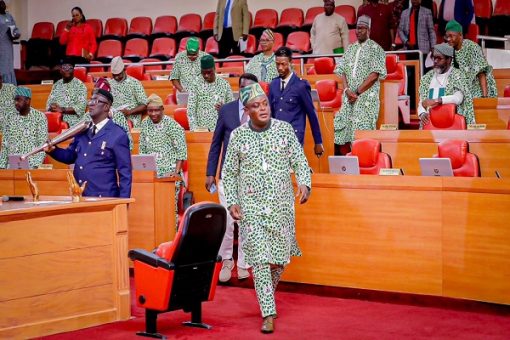The Lagos State House of Assembly is set to replace the existing 37 Local Council Development Areas in the state with Area Administrative Councils.
The 37 LCDAs were created by President Bola Tinubu in 2003 when he was governor of Lagos State.
Each Area Administrative Council shall now be funded by the Local Government Area under which it falls.
This is contained in a Bill for a Law to provide for Local Government’s System, Establishment And Administration And to Consolidate All Laws On Local Government Administration And Connected Purposes, which went through a public hearing on Thursday.
The bill specifies that the system of local governments will be controlled by democratic elections.
According to the Bill, there shall be 20 Local Government Areas in the state as specified in the Constitution of the Federal Republic of Nigeria, 1999.
The bill is coming on the heels of the financial autonomy recently granted to the 774 local governments in the country by the Supreme Court, which specified that money would not be released to any local government which has no democratically elected executive members.
“As from the commencement of this Law, the Lagos State Independent Electoral Commission shall conduct elections into the 20 Local Government Councils in the state as recognised by the Constitution of the Federal Republic of Nigeria, 1999 (as altered).
“The 20 Local Government Councils shall have designated Area Administrative Offices as listed in the 1st Schedule to this Law for effective and efficient local government administration in the state.
“There shall be 37 Area Administrative Councils in the State with the names specified in Schedule 11 of the Creation of Local Government Areas (Amendment) Law of 2004,” the Bill stated.
It was added that each Local Government’s Administrative Council shall be headed by an Area Administrative Secretary, who shall be appointed by the Governor subject to the confirmation of the House.
The bill states that each LGA has the power to delegate any of its functions to the Area Administrative Council falling within the territory of the LGA.
“Notwithstanding anything to the contrary in any other law, each Area Administrative Council will retain all the rights, interests, obligations and liabilities, which became vested in or attached to it under any contract or instrument, or on law or equity, all the time it was operating as a Local Government Area.
“Subject to the provisions of the Independent National Electoral Commission Act, the State Electoral Commission, LASIEC, shall divide each Local Government Area into such number of wards, not being less than 12 or more than 40 as the circumstances of each Local Government Area may require,” the bill read.
The proposed law, in Section 30, also stated that the Governor shall have the right to suspend any Chairman or Vice Chairman or any elected official/political appointee, which it said shall at the expiration of such suspension, resume office and shall notify the House upon resumption of office.
Stakeholders at the event include His Royal Majesty, the Ayangburen of Ikorodu, Oba Kabir Shotobi, the Chairman of Odi Olowo/Ojuwoye LCDA, Rasak Ajala, a former commissioner in the state, Hon Oyinlomo Danmole and Senator Musiliu Obanikoro.
The stakeholders faulted some aspects of the bill.
Ajala said the move would lead to underdevelopment in the grassroots.
So far, the state has been running the LCDAs with its internally generated revenues and part of the funds from the federal allocation meant for the other 20 LGAs.
He said, “Even with LCDAs, the money meant for a particular area would be shared by the main local government and the LCDAs, so changing them to development areas would have no effect.
“The Assembly should leverage on the powers conferred on them by Section 7 sub-section 1 of the Nigerian Constitution and allow the LCDAs to be,” he said.
Oba Shotobi also insisted that the LCDAs were aiding developments at the grassroots level.
In his comments, Obanikoro faulted the Assembly for not giving the public hearing proper publicity, saying that the problems in the local governments were deep and profound.
“The public hearing is being done without due consultations. In a democratic setting, the people are more important. I can’t even see any leader of our party, the All Progressives Congress, here. What we enjoyed as local government chairmen are no longer there,” he said.
The Speaker of the House, Mudashiru Obasa, said earlier in his speech delivered by his Deputy, Mojisola Meranda, that “we are gathered here to consider and reflect on a bill that seeks to further enhance how our third tier of Government should be administered.”
Two weeks ago, people were also gathered to deliberate on an electoral bill for the Local government elections before the House would go into how the local government should function.
“This bill has passed the preliminary stages, and the House is hereby subjecting it to public appraisal in our transparent convention.
“At this stage, we subject the bill to public assessment, gathering public observations and thoughts to reflect on them in the next stage of the bill.
The bill seeks to consolidate all laws on local government administration. The law, when passed, will allow the local government to function optimally with strict adherence to the rule of law and separation of powers within the Local Government.
“The bill clearly states the functions of the Chairman, Vice chairman, Legislative council and other local government functionaries.
“The bill also emphasises the creation of thirty–seven Area administrative councils, in addition to the original twenty Local Governments listed in the bill. The councils would be headed by Area administrative secretaries to be appointed subject to the approval of the House,” he said.
Related posts
Subscribe for newsletter
* You will receive the latest news and updates on your favorite celebrities!

